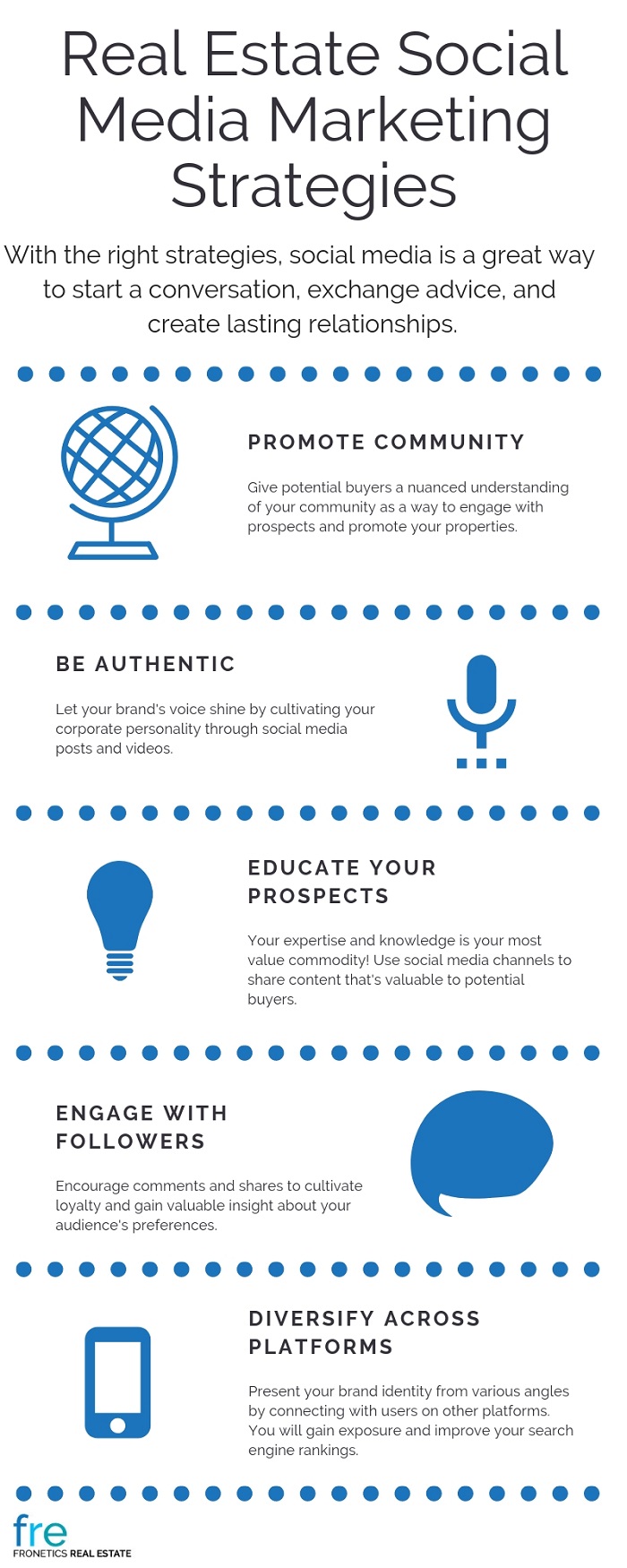Archive for the "Social Media" Category

How to Use Instagram for Real Estate Marketing
Instagram is a natural fit for real estate. Here’s what you need to know about using Instagram for real estate marketing.
Highlights:
- Instagram content needs to be consistent in tone and timing, visually appealing and engaging.
- Instagram Stories and Highlights are ideal ways for real estate marketers to give users a look into their brand.
- Hashtags promote engagement and raise brand awareness.
With its highly visual platform, robust Stories feature, and growing user base, Instagram is a natural fit for real estate marketing. The platform boasts over 500 million users and 4.2 billion likes per month. Used strategically, it’s an ideal place to showcase your properties and brand.
Real estate marketers should be aware that Instagram requires a different content and posting strategy from Facebook, Twitter, LinkedIn, or other social media platforms. For example, engagement on Instagram is ten times higher than it is for Facebook, and the demographic is substantially more affluent — making it a no-brainer for luxury real estate.
In general, marketers have been relatively slow to adopt Instagram for real estate marketing, a puzzling reality given its overall popularity and natural fit for the visual nature of real estate. But savvy marketers, like these five real estate accounts for example, have figured out how to use this platform to great success.
Instagram for real estate marketing — the right kind of content
Instagram is a fantastic platform for engaging users. But to get the most out of it, it’s important for real estate marketers to post the right kind of content. Obviously, Instagram is a highly visual medium. It lends itself to beautiful, arresting images, and pitchy hashtags.
Keep your content and visual style consistent. Your profile is your calling card on the platform and should reflect the overall tone you want to set for your brand. This also means posting content at a consistent rate, ideally 2-3 times a day.
Chances are, you’ve had fun playing with Instagram filters. But you may not know that certain lighting and color presets perform better than others. According to Iconosquare, the most popular filters currently on Instagram include Clarendon, Juno, Lark, and Ludwig — and they really do have an impact on engagement.
In order to determine the best types of content to engage your target audience, keep an eye on your competitor and peer brands’ presence on the platform. You can also make use of Instagram analytics tools to track, analyze, and benchmark your Instagram content.
Instagram Stories and Highlights
When the feature was first introduced, Instagram Stories was a gamechanger for the ways in which users interact on social media. Stories are sequences of content that users post to their Instagram accounts over a 24-hour period. Besides photos, Stories can include videos, live and prerecorded, as well as Boomerangs, seconds-long motion clips that play forward and backward.
Stories can also be customized with various design tools, including stickers and filters. Notably for real estate marketers, these tools include location tags, as well as time, weather, or holiday greetings. Audiences can view the Stories of the users they follow within the 24-hour window after they are posted. They can find users with active Stories by scrolling the user icons at the top of the app. Or users can tell their followers that they’ve posted a story by tagging them, which notifies them through a direct message.
For brands, Stories offer the invaluable feature of having metrics wrapped into the experience. The feature allows you to track not only how many views your story has received, but exactly which users have viewed it, and how they interacted with it.
In addition to its Stories feature, Instagram now lets users create a featured group of “Highlights” in various categories on their profile. Stories have only a 24-hour lifespan, so featuring your most effective Stories clips in Highlights gives them a second life, and a chance to engage future followers.
Hashtags
One of the most effective ways to grow your Instagram following is to use hashtags effectively. Since Instagram gives users the ability to follow hashtags that interest them, and they function as links to other relevant content, choosing the right hashtags is the ideal way to reach and engage your target audience.
Keep an eye on accounts of peer brands, to stay up to date with the best hashtags to be using. The most effective hashtags are short, memorable, and easy to read. You can also use a free online tool like InconoSquare or Websta to find relevant hashtags for the real estate industry. For much more, check out our guide to using hashtags for real estate marketing.
If you want engagement, engage
It’s easy to forget that the fundamental benefit of social media is that it’s social. Users want to be part of a conversation. Encourage your followers to interact with you on all your social media platforms, including Instagram. This means responding to comments and brand mentions, as well as engaging with your followers’ content.
Starting and fostering a conversation with your followers and peer brands on Instagram is a key to getting the most out of this platform. Encouraging interaction helps drive brand awareness, and lead generation for your properties. Now, the time has come for you to master Instagram for real estate marketing.
Related Posts
- How to Use Social Media Hashtags in Real Estate Marketing
- Real Estate Instagram Accounts You Should be Following
- Social Media Trends for 2018 Real Estate Marketers Need to Know
Archive for the "Social Media" Category

3 Social Media Mistakes Real Estate Companies Still Make
Social media is a valuable tool for real estate businesses, but only if they use it to their best advantage and avoid these three common mistakes.
Highlights:
- By 2019, there will be an estimated 2.77 billion social media users around the globe.
- It’s imperative for real estate businesses to have a clear strategy that includes types of content, frequency, and pillar topics.
- Real estate companies need to focus on creating content that leaves their users wanting more.
As many as 81% of small and medium businesses use a social platform. And we all understand why. By 2019, there will be an estimated 2.77 billion social media users around the globe. That’s a lot of potential customers.
So, there’s no question as to why real estate companies are jumping on the social media bandwagon. And there’s no disputing social media is an effective way to increase brand awareness and generate leads. But it can be fairly useless if your company isn’t doing it right.
Top three social media mistakes real estate companies still make
Mistake #1: Using objectives instead of strategy
Social media platforms are continually making changes and updates to improve the user experience. In order to weather these changes and keep your audience engaged, it’s imperative to have a clear strategy that includes types of content, frequency, and pillar topics. Posts should reflect your real estate brand, so make sure posts follow style guidelines and reflect your specific tone.
A strategy will also help prove ROI. Social Media Examiner’s 2018 Social Media Marketing Industry Report found that only 44% of marketers agree that they know how to measure social media ROI. That means two-thirds of marketers don’t know whether or how much their marketing efforts are paying off when it comes to the use of social media. A strategy that incorporates defined goals, tracking and measuring will help prove data-driven ROI and improve your social media presence.
Mistake #2: Using the most popular social media platforms
Not all social media platforms are created equal. In fact, all social media channels have different qualities that make them appeal to specific audiences. Start by identifying which platform your target audience is the most likely to seek out. For example, 81% of millennials view their Twitter account on a daily basis. If your company is looking to capture millennials as leads, your social media efforts should certainly include Twitter.
Once you’ve determined where you should be posting, concentrate on creating content that caters to those specific platforms. Lots of companies post the same content across all of the apps they use. We understand how easy that is for marketers, especially with automation tools. But the foundation of social engagement is authenticity, something that is hard to achieve when posts are the same across all channels. Work to create content — including video and images of properties — that caters to specific platforms to build brand awareness and loyalty.
Mistake #3: Promoting instead of connecting
Social media is all about engagement. Users don’t want to engage with brands that are pushing their properties. Users want informative, interesting, and yes, even fun content. Real estate companies need to focus on creating content that leaves their users wanting more.
Companies that are succeeding on social media are finding innovative and creative ways to relate to users. When you engage and get users involved in your story, you create long-lasting customer relationships. Storytelling creates an emotional bond with your company and drives brand loyalty.
Greg Hadden, executive creative director of Motive Made Studios, sums up the power of connecting with users: “What often gets lost is the fact that good storytelling is potent stuff. It has the power to make people want to believe and to belong, which is the goal of all storytellers. We’re all selling something, be it an idea, an exploration of the human condition, or say, a vacuum cleaner. It’s no mistake perhaps that good stories often create products.”
Final thoughts
Social media platforms are a powerful resource that can help your real estate business grow. But they have to be used correctly. Creating a documented strategy will help shape your brand’s social media presence and give you milestones to test and tweak your progress. Need help creating a social media strategy? Let us help.
Related posts:
- Infographic: Real Estate Social Media Marketing Strategies
- Social Media Can Be a Strategic Weapon in Real Estate Marketing
- A Visual Guide to Social Media Posting Frequency for Real Estate
Archive for the "Social Media" Category

Top 10 Social Media Posts 2018
Here are Fronetics Real Estate’s most viewed social media marketing posts from the past 12 months.
We all know real estate marketing is increasingly intertwined with social media. These platforms are extremely powerful ways to engage with potential buyers and renters, and to reach new audiences. At Fronetics Real Estate, we write a lot about how to use social media for real estate marketing.
These are our top 10 social media posts from 2018.
1. 10 Social Media Statistics for Real Estate Marketers 2018
No matter what happens, we can always count on one thing to stay the same: Social media will always be changing. 2018 has been a remarkable example of that thus far, particularly in regard to platforms like Facebook. Every so often, we like to take a step back and look at what the data is telling us about where social media is heading and what that might mean for real estate marketers. Read more.
2. How Will Facebook Marketplace Housing Affect Real Estate Marketers?
If you’re a real estate marketer, Facebook’s newest foray into the social marketplace is likely to impact your strategy. In November, the ‘Book announced it would begin allowing users to search for housing rentals and sales on its Marketplace platform. For those who are unfamiliar, Marketplace is Facebook’s answer to Craigslist — a platform that lets users buy and sell items near them. Read more.
3. Social Media Trends for 2018 Real Estate Marketers Need to Know
If there’s one thing real estate marketers can be sure of in the coming year, it’s that social media will continue to dominate the marketing landscape. Social media presents tremendous opportunity, particularly if you’re aware of upcoming trends. Read more.
4. How to Use Social Media Hashtags in Real Estate Marketing
You’re likely to be vaguely aware of hashtags, at least in your personal social media life. But perhaps you’re not intimately familiar with how they can play into your real estate marketing strategy. Whether you #lol at it or not, using social media hashtags wisely can actually be a major boon to your social media marketing efforts. Read more.
5. A Visual Guide to Social Media Posting Frequency for Real Estate
“Content is king, but distribution is queen and she wears the pants.” These are wise words from BuzzFeed’s Jonathan Perelman, indicating that creating interesting and pertinent content is just half the battle. To reach your target buyer or tenant, raise brand awareness for your property, and drive sales, your content needs to be delivered consistently over time, at the right time, and on the right platform. Read more.
6. 4 Things to Do in Light of Facebook News Feed Changes
Mark Zuckerberg once again rocked the world on Jan. 11 — at least for businesses — when he announced that the Facebook News Feed was evolving to include less public content, meaning content from Pages of businesses, brands, and media. The algorithm will now prioritize posts from friends and family (over public posts) and those that “spark conversations and meaningful interactions between people.” Read more.
7. Should I Be Using Facebook Carousel Ads?
Facebook carousel ads offer a highly visual and engaging way to promote your properties. Not only that, Kinetic Social recently found that carousel ads are up to 10 times more effective than static sponsored Facebook posts at driving traffic to advertisers’ websites. And if that’s not enough, they boast a 72% higher click-through rate than single-image mobile app ads. Read more.
8. 5 Real Estate Instagram Accounts You Should be Following
Instagram remains an emerging platform for real estate professionals, and, given its overall popularity, it’s puzzling that it hasn’t taken over the real estate marketing world. With the majority of real estate searches beginning online, social media is an ideal way to showcase listings. Read more.
9. Must-Know Social Media Strategies for Real Estate
Real estate is a people business. That’s why you should leverage a marketing tool that is also all about people: social media. If you have not begun developing social media strategies for your real estate business, now is the time to get started. Consider for a minute that in 2017, 81% of Americans had at least one social media profile. And the numbers are projected to continue skyrocketing: by 2020, 200 million people just in the U.S. are estimated to be on social media. Read more.
10. Measure Social Media Success in Terms of Potential, not Dollar Amount
One of the trickiest things about implementing a social media strategy is that social media success can be difficult to measure. While most real estate professionals acknowledge that a social media marketing presence is important, it’s hard to make a case for resources when you can’t precisely quantify the value in terms of dollar amount. Read more.
Stay with us in 2019 for the latest on social media real estate marketing. Which posts will you find the most useful and interesting?
Related posts:
- Paid Digital Advertising: A Beginner’s Guide for Real Estate Marketers
- 4 Steps to Building a Successful DIY Content Marketing Strategy for Real Estate
- Start Your Property’s Social Media Program in 6 Steps
Archive for the "Social Media" Category

How to Nurture Real Estate Leads with Content Marketing
Done right, content marketing is the most effective way out there to generate real estate leads—and to nurture them to fruition. Here’s how to make the most of this strategic resource.
If you generate a huge amount of leads, that means you’ll get an influx of new clients, right? Not so fast. Having an effective lead generation campaign is great, but it’s only half the battle. To produce actual business, you need a strategy in place to nurture real estate leads once you’ve attracted them.
An effective lead generation campaign means having a documented strategy, an effective website with strong SEO, good calls-to-action, and a robust social media presence. All of these things can be best accomplished with content marketing — and it’s your best friend when it comes to nurturing and converting those leads you’ve generated.
Nurture real estate leads with content marketing: a crash course
Before we get too far, let’s slow down and define what it means to nurture real estate leads with content marketing in the first place. In fact, real estate marketers are often so focused on generating leads, that this crucial part of the process gets overlooked.
At its most basic level, when we talk about nurturing a lead, we’re talking about continuing a conversation. When you generated the lead, you attracted the attention of a prospect, and planted the seeds of an ongoing relationship. But in order to germinate, these seeds need to be cared for — and that’s what lead nurturing is all about. You continue to stay in a conversation with your prospect from the first contact until they are ready to become a client.
Putting your content to work
“Lead nurturing campaigns focus on creating mutually-beneficial working relationships so that when it comes time to buy, that lead turns to you, or your business, instead of a competitor,” writes real estate marketing expert Vinny La Barbera. When it comes to staying at the forefront of a prospect’s mind, and successfully nurturing a real estate lead to conversion, there’s no better tool at your disposal than content marketing.
Social media is a perfect place to use content to nurture real estate leads. Connecting with your prospects, answering their questions, and sharing relevant, helpful content (particularly video!) is key to staying on your prospects’ radar.
Another effective way to use content marketing to nurture leads is with a blog. While some of your posts should be geared to generating leads, others should be written with a focus on cultivating existing relationships, and helping prospects decide to take the next steps. For real estate marketers, this means you can write about topics like the location of your properties, available features and amenities, and information about neighborhoods and communities.
Of course, email content is crucial to an effective lead nurturing strategy. The first step is to segment your email list, so that you’re creating targeted messaging for those at different stages of the buyer’s journey. Your emails should always include a call-to-action, to give prospects the opportunity to engage further with your brand and properties.
The bottom line
With any of your content marketing efforts, including nurturing real estate leads, the most important thing to keep in mind is that you are offering value to your prospects. By sharing your knowledge and expertise through your content, you’re answering the needs of your prospects and building their trust in your brand and properties.
Related posts:
- 5 Luxury Real Estate Brands that Use Content Marketing to Sell Property
- Video: How Content Marketing for Real Estate Can Help Sell Properties
- 4 Ways a Blog Can Help You Sell Real Estate
Archive for the "Social Media" Category

Infographic: Real Estate Social Media Marketing Strategies
Social media for real estate marketing is one of the most powerful tools out there. Our infographic will help you figure out the best social media marketing strategies—and the mistakes to avoid.
We’ve said it before, and we’ll say it again: real estate marketing and social media are a match made in heaven — when used correctly. With the right strategies, using social media for real estate marketing is a great way to start a conversation, exchange advice, and create a lasting relationship with prospects.
We can’t stress enough that to be effective, social media needs to be done right. Bubba Mills, chief executive officer of Corcoran Consulting & Coaching advises, “done right, social media can increase your trips to the bank. Done poorly, it can drive you to the poor house.” Take a look at our infographic with social media do’s and don’ts for real estate marketers.
What you should be doing: social media marketing strategies
Promote the community, not just your properties
Renters, buyers, and investors are looking for more than just a property — they want to know something about the place they’re considering living or investing in. Too many real estate blogs just skim the surface of what communities have to offer. Making use of social media platforms to give potential buyers a nuanced understanding of your community is a great way to engage with prospects and promote your properties.
Be authentic
Social media for real estate marketing is all about the personal. Users on these platforms are looking to connect with the real people behind the brands they follow. Part of building your brand is about discovering and cultivating your “corporate personality,” particularly when it comes to social media. Find your brand’s voice, and let it shine through.
Educate your prospects
You may not expect it, but social media users actually like educational content. According to the 2018 Sprout Social Index, 59% of customers express greater trust for “posts that teach” on social media. Educating your audience is also at the core of content marketing — at the end of the day, your knowledge and expertise is your most valuable commodity — even more so than your properties. Use your social media for real estate marketing to share content that’s valuable to potential buyers and renters, whether it’s buying guides, case studies, or local statistics.
Engage with your followers
It may seem painful obvious, but too many real estate marketers forget that social media is just that: social. When followers engage with your posts, always reply! Encourage comments and shares, and join the conversation. Not only is it a great way to cultivate a loyal following, but you can also gain valuable insights into your audience’s preferences.
Diversify across platforms
While Facebook still reigns supreme in the social media universe, if you aren’t connecting with users on other platforms, you’re missing out on huge opportunities. While each platform requires its own content and posting strategy, you’re essentially presenting your brand identity from the various angles allowed by different platforms. Not only that, using multiple social media platforms helps improve your search engine rankings.
Steer clear of these practices
Overzealous advertising
Nobody likes pushy sales language, especially on social media. Steer clear of posts that do nothing but overtly promote your properties. Instead, focus on educating your audience, and answering their questions.
Forgetting the visual
Social media is all about the visual, especially video. Be sure to include relevant images with posts and use video whenever possible.
Assuming that just because you’re online, offline rules don’t apply
It may seem obvious, but it’s all too often forgotten. This is a good rule, and an easy metric by which to judge any content before posting: Your interactions online should measure up to professional interactions you would have in person.
Reposting without checking
Re-posting content that’s of interest to your audience is a great way to promote discussion and engagement. But don’t get sloppy. Remember that even if content didn’t start with you, if it’s posted on your company’s social media accounts, it represents your brand and properties. Make sure content is well-researched and from reliable sources. Want to re-post something controversial? Just be sure to include a disclaimer or explanation in your post.
Forgetting about emotional intelligence
Never forget that behind every social media account is a human being. The bottom line: bring emotional intelligence to your social media management. Take the time to address any issues with compassion and understanding.
The takeaway
With the right strategies, social media is an extremely effective tool for real estate marketers to promote their brand and properties. But it does require a significant investment of time, resources, and creativity. Start connecting with your audience, and watch your brand grow.
Related posts:
- Social Media Can Be a Strategic Weapon in Real Estate Marketing
- 5 Tips for Building a Successful Real Estate Social Media Marketing Program
- Must-Know Social Media Strategies for Real Estate
Archive for the "Social Media" Category

Social Media for Real Estate: 5 Social Media Hacks to Grow Your Business
Social media and real estate are a natural match. These five strategies will help you make the most of this powerful set of marketing tools.
Social media for real estate marketers is a powerhouse. These are free platforms that marketers can use to share their businesses with the public, generating plenty of returning customers in the process. These five social media hacks are a great place to get started growing your real estate marketing business.
1. Find your brand identity using social media for real estate
One of the top frustrations among new social media marketers happens when they try to create a strong following based solely on name recognition. In order for your target audience to be reached and engaged, your brand’s identity needs to be fully fleshed out and presented in your online profiles. Presenting a strong brand identity gives potential buyers the tools to find you, and to decide that you’re the right match for them.
2. Diversify across platforms
While Facebook still reigns supreme in the social media universe, if you aren’t connecting with users on other platforms, you’re missing out on huge opportunities. While each platform requires its own content and posting strategy, you’re essentially presenting your brand identity from the various angles allowed by different platforms. Not only that, using multiple social media platforms helps improve your search engine rankings.
3. Get social—connect with relevant groups
We’ve written before about the value of guest blog posting when it comes to real estate marketing. The same holds true for your social media for real estate strategy. Finding relevant influencers for your brand, and affiliating with them on social media is a great way to reach a broader segment of your target audience. Reach out to influencers to ask them to share your content—it’s a win for both of you.
4. Keep up with the latest
Staying up with what your audience and community on social media is talking about helps ensure that your content is relevant and engaging. Follow hashtags that are relevant for your real estate business, for example, and when you see content that resonates, share it on your own profiles, along with some analysis.
5. Use SEO tools
SEO tools (like Google Trends, Similar Web, and more) aren’t just for websites—they’re an excellent way to boost your reach when you leverage social media for real estate. These tools can help increase your follower counts, as well as your post visibility. In turn, your search rankings will get a boost.
Building your real estate brand can seem like a daunting task, but social media for real estate provides real estate marketers an easy-to-use set of tools. Be strategic about your content and strategies, and watch your business grow and develop.
Related posts:



